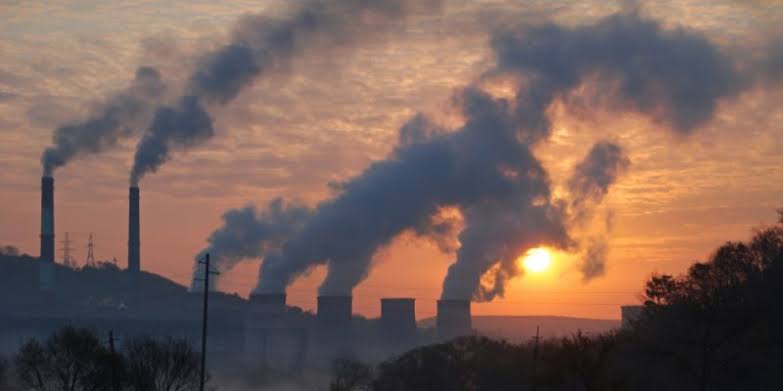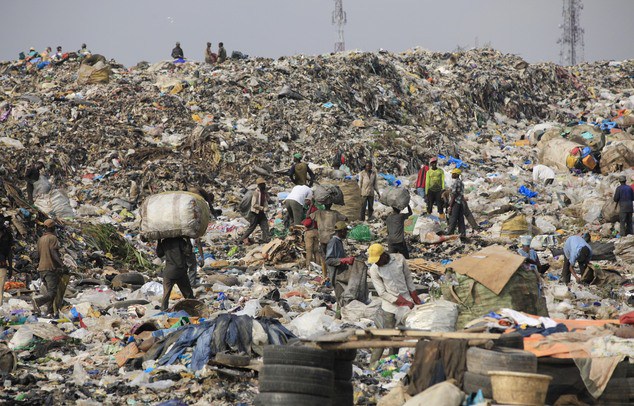Revealed! Lagos Areas Where Air Quality Is Unhealthy

By Femi Akinola, Omotunde Ojugbele
The air quality in Lagos, Nigeria’s largest city, is deteriorating at an alarming rate, according to a recent report by the Lagos State Environmental Protection Agency (LASEPA).
The report, which shows that Lagos’s air quality index (AQI) ranges from unhealthy to very unhealthy, was based on the latest scientific data and models.
The AQI measures how polluted the air is and how it affects human health. The lower the AQI, the better the air quality.
The AQI ranges from 0 to 500, with 0 to 50 being good, 51 to 100 being moderate, 101 to 150 being unhealthy for sensitive groups, 151 to 200 being unhealthy, 201 to 300 being unhealthy, and 301 to 500 being hazardous.
The report shows a moderate to very unhealthy Air Quality Index from Lagos island to major parts of the mainland.

The main culprit behind Lagos’s poor air quality is particulate matter (PM), which are tiny particles of dust, smoke, soot, and other pollutants that can penetrate deep into the lungs and bloodstream. The main sources of PM in Lagos are vehicle emissions, industrial activities, waste burning, and biomass burning.
The LASEPA report warns that exposure to PM can lead to various health problems, such as asthma, bronchitis, lung cancer, cardiovascular diseases, and premature death.
The report also estimates that air pollution is responsible for about 11,000 deaths per year in Lagos.
The adverse effect of air pollution in the megacity often falls proportionately on the urban poor, with attendant risks and hazards compounding the impact of other environmental problems such as lack of clean water and sanitation.
Pollution is a major challenge in many cities across Nigeria, but it is especially bad in Lagos, a megacity of over 20 million residents.
Lagos is known for its notorious environmental pollution. There is air, water, noise, and land pollution from industrial and commercial activities, as well as a massive and rapidly growing human population in the city-state.
In the World Bank study titled “Cost of Air Pollution In Lagos” in 2018, it was estimated that the health cost of air pollution in the city was $2.1 billion and caused an estimated 11,200 premature deaths across the state.
The latter study, carried out in 2020/2021, revealed a worsening air quality situation in Lagos, requiring urgent attention by the authority.
The air quality index recently released by the Lagos State Environment Protection Agency (LASEPA) shows there is no significant change in the quality of air in Lagos.
NatureNews investigations into air pollution in Lagos show that human-generated air pollution sources can be divided into mobile and stationary sources. While the former includes automobiles, buses, trains, aeroplanes and other powered modes of transportation sources, the latter has to do with factories, incinerators, landfill sites and other kinds of non-mobile sources.
In addition to the sources above, investigations revealed other reasons responsible for pollution in Lagos.
These include an increase in population growth, which presently stands at the rate of about 6.8% compared with the national and global figures of 2% and 0.8%, respectively.
Uncontrolled physical development with adverse impact on the adequacy of available public infrastructure like drainage, rapid increase in waste generation state-wide, which was over 10,000 metric tonnes daily, high impact of stormwater flooding and erosion, inadequate and ineffective solid waste management, sub-optimal sanitation level, especially in the densely populated areas in metropolitan Lagos, and inadequate environmental data.
Importantly, indiscriminate dumping of solid waste and used plastic materials in open drainages, which were common at markets across the city and communities, often blocked the free flow of wastewater in drainages across the city centre.
The existence and operation of landfill sites in the city centre have now become a source of respiratory problems among the residents, particularly the younger ones. There are other sicknesses troubling Lagosians, which are by now traced to air pollution, and a large number of residents go to hospitals every day for treatment.
The principal causes of air pollution in Lagos, as revealed in the course of investigations, are twofold: the large number of vehicles on major Lagos roads.

Approximately there is a million of cars, buses, trucks and utility vehicles that are using diesel plying Lagos roads on daily basis apart from thousands of tri-cycle (Keke Marwa) and millions of motorcycles (Okada).
One will not be wrong to say 40% of Nigeria’s total fuel consumed in Lagos everyday by cars, lorries, tankers, utility vehicles and power generators. With this, Lagos injects about three tonnes of lead into the air every day.
On the part of stationary sources of pollution in the megacity, investigations conducted show that there are three landfills and two temporary dumpsites serving the city. Three additional dumpsites landfill sites existing in the suburb of the city arethe Owutu site in Ikorodu, Sangotedo at Eti-Osa and Temu site in Epe.
These sites serve as back-ups for the three principal dumpsites in the city center. They are temporary sites, an receive an average waste of about1,864 cubic meter per day.
The Olusosun landfill site situated near Ojota, Lagos, receives approximately 40% of the total waste deposits from all around Lagos. The size of this landfill site is 42.7 hectares and a residual life span of 20 years.
The Oke-Odo landfill site at Abule-Egba area of the metropolis occupies a land of about 10.2 hectares. It received waste from the densely populated part of Lagos. Its residual life span is approximately eight years. The Soulous landfill sites are situated along Lagos State University -IBA road. Soulous II exists on 7.8 hectares of land with an average life span of five years, while Soulous III, within the same axis, exists on five hectares of land with an average life span of five years. Each site receives an average of about 2,250m3 of waste per day.
NatureNews checks on the landfill sites revealed that they are poorly maintained because they regularly emit offensive odours which residents inhale and affect different kinds of sickness. The odour levels from the three landfill sites in the city centre are significantly high, while the measured air quality parameter concentrations at the sites signify a badly impaired airshed and can be classified as having poor quality, which calls for urgent attention. Okobaba sawmill is one of the biggest sawmills in Nigeria, contributing about 80% to 90% of the wood used in Lagos. It is located at the Lagos Lagoon in Ebute-Metta; the sawmill accommodates over 2,000 sawmill operators and workers.
The sawmill is another source of air pollutants in Lagos. Okobaba is a place where biomass residues are regularly burnt at the site or dumped indiscriminately in the lagoon, with significant native impacts on the local communities as well as contributing to climate change. What usually welcomes people to the Oko-Oba abattoir complex in Agege, located on the old Lagos-Abeokuta road, is the pungent smell emanating from inside the abattoir. The stench is very strong and fouls the air. It often even triggers breathing discomforts in passers-by, including visitors to the abattoir complex who are not used to such a sudden and unpleasant odour.
Taiwo Omilani is a journalist residing in the Fagba area near Agege, Lagos. She regularly complained about the odour of animal wastes produced on a daily basis at the Oko-Oba abattoir, where hundreds of cows are slaughtered every day, including the offensive odour emitted from the Oke-Odo landfill site, which was less than ten minutes’ drive away from the abattoir.

“Residents are tired of what we’re inhaling from both the abattoir and the Oke-Odo landfill sites. I believe you can also perceive the foul odour. It’s just bad that such is happening in a place being referred to as Centre of Excellence”, Mrs Taiwo Omilani told NatureNews, adding that residents and particularly traders in the communities near the abattoir and the landfill site endure the foul smell that emits from both because they must fend for the upkeep of their families.
She called on the state government to introduce stiff measures that would force butchers at the Oko Oba abattoir to keep their environment clean and dispose of heaps of animal waste generated daily at the abattoir in a more civilized manner.
Speaking on the level of air pollution in Lagos, the LASEPA Managing Director, Dr Babatunde Ajayi, explained that the current reading of the air quality index in the city-state is unsatisfactory.
According to him, all hands are on deck at LASEPA to tackle the problem of environmental pollution in Lagos and bring sanity and orderliness to the state.
He stressed further that measures like public enlightenment would be combined with strict environmental law to achieve the agency’s set goal.
Ajayi reiterated his promise to ensure cleaner air and better living conditions for residents in the state when he resumed office not quite long ago.
He emphasized the critical role of environmental awareness and collaboration in mitigating the impact of poor air quality.
Health issues such as anaemia, hypertension, visual impairments, and cardiac problems can be linked to subpar air quality in affected locations, stemming from diverse sources like traffic, industrial activities, agriculture, and domestic generator emissions.
Identifying bovine skin burns and pollution from densely populated industrial zones as primary causes, Ajayi attributed these health challenges to both inadequate vehicle maintenance and specific behavioural patterns.
He highlighted the prevalence of poorer air quality in areas with high industrial concentrations throughout Lagos.
Ajayi underscored the value of embracing green energy and tree planting as safer, more secure, and environmentally friendly alternatives, advocating for their adoption over conventional fuel sources.
Additionally, he promoted eco-friendly transportation options such as carpooling and public transit to alleviate traffic congestion.
Relating LASEPA’s commitment to environmental monitoring and implementing programs to create a cleaner, safer, and pollution-free environment, Ajayi assured compliance with legal requirements in pursuit of a healthier and more sustainable Lagos.
